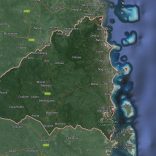Mozambique: Terrorists claim deaths of 30 soldiers in Macomia district - AIM report
Mozambique: Experts warn of demographic growth pressure on job demand – Listen

File- For illustration purposes only. Quelimane. [File photo: VOA Portugues]
- An unqualified workforce is growing rapidly.
Mozambique is experiencing a demographic explosion which could in a few years bring pressure to bear on the demand for employment by the young people who make up the bulk of the population.
The pressure is already at the door, induced by the ever-increasing number of young people with weak or even no professional or academic training.
“We don’t have jobs – I don’t know why,” says Razão Leopoldo, a young man who left Nicoadala, in central Zambezia province, for Maputo in search of a job.
But all he found in this presumed El Dorado was a makeshift one-metre-square stand where he sells second-hand cell phone accessories. He says he tried to get a job on his medium-level education, but never got one, and has no doubts about why.
“I think our government, perhaps, is choosing. We, the poor, don’t have jobs; the bosses’ children are the ones who do,” he reasons.
Razão is 22 years old, and a portrait of thousands of young Mozambicans. His situation exposes the dangers, risks and challenges of a country in which about 15 million people, corresponding to half of the population, are between adolescence and youth.
Demographic potentials and risks
Demographer and university professor Carlos Arnaldo looks at the age pyramid and analyses it from the perspective of development potential.
“There is indeed a potential for development in our structure. If we can transform, first, our age structure, then accompany this with adequate preparation of this potential workforce, so that in the future, it can compete in the labour market, this can be to our advantage,” the demographer proposes.
Arnaldo points out, however, that “this can only be an advantage if there is a large investment in relation to basic needs at this time, and if there is also social investment capable of transforming the age structure so that we can think about claiming these demographic dividend gains”.
But, for the time being, all Arnaldo sees are huge challenges, as the picture shows impending pressure in terms of demand for jobs, which carries with it social risks.
“We have a workforce that is growing fast, but is also growing up without qualifications. This can have consequences for the possibility of being able to participate in the economy and, if they cannot participate, it can generate frustration for a much larger number of people,” he warns.
A time bomb
Reverend Anastácio Chembeze is the director of the Alberto Cassimo Institute for Vocational Training and Labour Studies (IFEPLAC), a public institution created to provide guidance and response to employment issues. He looks at demographic trends as a time bomb that can only be defused with a strong focus on education, and especially on self-employment.
“It is necessary to invest a lot in professional education – on technical education and vocational training. Vocational training has an advantage, because courses and qualifications are relatively short, and prepare young people for the labour market, They can continue their studies at other levels while working,” he explains.
According to Chembeze, the country needs to accelerate investment in this sector, as it is the only way to secure transformation and turn the current demographic trend into a factor for development.
“Right now, we haven’t taken the big steps yet. We’re taking small steps, and if we don’t speed things up, we’re going to get a shock,” he warns.
Listen to the audio (in Portuguese).












Leave a Reply
Be the First to Comment!
You must be logged in to post a comment.
You must be logged in to post a comment.